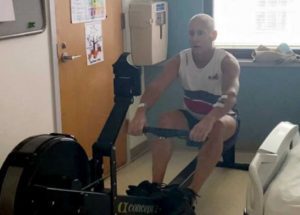We had an awesome RowingChat today about the history of international British Women’s rowing. Jo Toch, Pauline Bird, Kate Grose all rowed for Great Britain and Helena Smalman-Smith is a rowing historian of the period. We have collated timestamps for the key points we covered during the interview. Below is a link to watch the video on YouTube or Listen on SoundCloud. Please subscribe to the Podcast on iTunes and, continue to tell your friends about RowingChat.
01:00 Introductions and personal background in rowing 05:00 The “average” training week for internationals in 70s, 80s and 90s.10:00 Personal pathways to international representation 13:00 Selecting club crews to be international representatives 17:00 What would you do differently if you had your time again internationally? 20:00 Racing the Eastern Block and drug taking in rowing 24:00 What has rowing lost now it’s professional? 35:00 Which coach was most influential in your development? Steve Gunn, Martin Fordham, John “Dickie” Bird, Bill Stagg, Daniel Topolski, Christopher George, Rosie Mayglothline, Bob Michaels 43:00 Stories of Amy Gentry and Eve Gould – the leaders who established British Womens Rowing
48:00 Memories of Beryl Crockford







This Post Has 3 Comments
Very good but women started rowing in the 19th century in skiffs for pleasure…
The rules of the early women’s skiff clubs were all about having a chaperon to avoid being alone wiith a man . Initially it was thought women were too delicate to race.
When races took place the winning crew was the one with the best style..
Furnivall started the first women’s club for competitive rowing in the early 20 th century.
Phoebe Rafley on the Lea started CECIL LADIES soon after World War One a competiitiivr club. They used both clinker boats and shells. The 8s were shells and they were based at one of the 3 Vincent Radley and sons boat houses at LEA Dock. Phoebe organised but did not compete as she was 38 in 1914 but rowed for pleasure in skiffs. There were numerous national newspaper articles about them and 2 Pathee news films of them. AMY GENTRY came soon after and founded Weybridge ladies sioon after and was a major influence on women’s rowing.ss well as rowing herself ?She was s leading light in the WARA and Cecil Ladies were one of the first members. A Miss Stuart joined Cecil Ladies in the 1920s the distressed of Douglas Rees Stuart who stroked Cambridge to success in 3 Boat races. She proved to be a fine oarswoman and Cecil Ladies had a lot of success due to her . She formed her own club Stuart Ladies in the 30s and they had great success. Women’s rowing,stopped in WW2! and AMY GENTRY worked for BARNS WALLIS on the begiinngs of the Bouncing Bomb research She took him out in skiff for his early experiments..
After WW2 Lea based women’s clubs were initially the most successful as they trained harder than other clubs..
In 1951 a GB Ladies team competed in a REGATTA at Macon agiainst European crews,. AMY GENTRY manager the team.
Another Radley , Shirley rowed in the GB 8 at bow at the age of 17 and she lived at Springhill at RADLEYs boat yard and was taught to row by her father Sid RADLEY a master boat builder .
The Macon REGATTA took place before the Men’s EUROPEAN ROWING CHAMPIION SHIPs.
A few years later the EUROPEAN CHAMPIONSHIPS included women’s events and GB competed.. The 1951 crew were real amateurs, They took leave from work and made their own rowing outfits.. They borrowed an 8 in France , s clinker whilst the other crews had shells, and they finished 3rd..
AMY GENTRY remained s leading liigth in women’s rowing until shr died. GB women had some success in the 60s 70s 80s and 90s etc then lottery money allowed them to be full time professionals and the medals flowed.
Thanks Clive – that’s a great summary. Appreciate you sharing with our readers.
Its Phoebe RADLEY not Rafley
not distressed should be sister